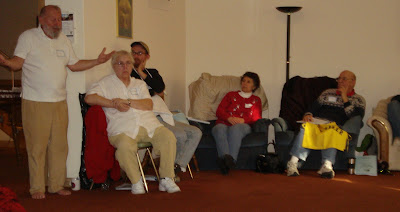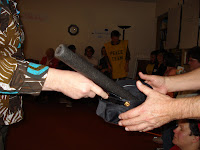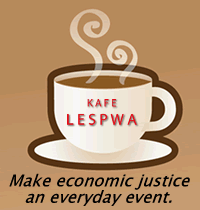One of the primary tasks of the Catholic Worker is the redistribution of wealth. One way of looking at it is actually very simple: We take offerings from those who have in order to make it available to those who have not. We have the great joy and privilege of being the ones in the middle of this transfer--what a blessed place to be! I still believe that if people knew just how blessed it was, they would be knocking down our doors trying to steal our jobs from us.
The clothing "free store" is a great example: Folks have excess clothing and household supplies they are glad to give. Most of what we have received so far is in very good condition and given with great love and care--you can tell. Other folks are struggling so being able to clothe their families frugally is a big deal. We make it available to them. Goods travel from areas where there is a surplus to where there is a deficit. It doesn't sound like communism--it rather sounds like a natural, healthy equilibrium for all parties. Folks who need have the opportunity to be blessed by receiving, and folks with a surplus have the opportunity to be blessed by giving.
I am often shocked at how simple it is.
To paraphrase St. John Chrysostom, our possessions are the Lord's, however we may have obtained them. It is pretty much an audacious idea to think we actually own any part of God's creation. Sure, creation is a gift to us, but since we are all equal in God's eyes, wouldn't it be appropriate to share creation equally among each other? It is God's gift to all of us. If a greater amount of wealth and property falls into our sphere of influence, that just means we have more to distribute to correct the imbalance.
If God came to the door and delivered Christmas dinner for the whole neighborhood, it would be terrible for a small group of us to hog more than our fair share while others did not get any at all--some folks taking seconds and thirds and squirreling away extras in freezer bags with others not even having a single plate. Rather, you would distribute the food so that everyone had some and it would probably be based on their need--the family with the growing teenager would get more than the elderly couple, but each would get their fair share.
On a small scale, the right thing to do is simple common sense, as the above example shows. But this is exactly how we squander the resources of the earth! Americans make up 5% of the world's population but consume almost 50% of the world's resources--an imbalance that is hard to justify when 1 billion people are literally starving to death at any given moment in time.
A Personalist Way
This isn't to say that all possessions are bad. When people oppose a system of injustice that they are embedded in, sometimes they still think in those terms. As good capitalists, we have been trained to accumulate. This accumulation is a form of power and protection. We have more stuff so that we can leverage more safety and pleasure for ourselves than others. When we see the injustice in this, all too often we assume that the answer to accumulation is to de-accumulate. And when you consider environmental strain and the fact that there is so much wealth concentrated among so few people, there is a pretty easy argument to simply have less stuff.
Live simply, so that others may simply live . . . Reduce, reuse, recycle.
Those are good mottoes--up to a point. However, they are also the words of capitalists trying to reform while still using the tools and mindset of capitalism. I think one of the reasons that Americans have difficulty with following these mottoes is that they sense that the only way to be good is to have less of themselves in the world. That doesn't settle well.
When we've been trained all our lives to accumulate more stuff, then the idea of de-accumulation is almost a form of suicide. We rarely think of it consciously, but when we have spent so much time seeing our very worth in terms of what stuff we have, then to have less stuff might equate to trying to erase ourselves from the world.
This comes to bear particularly strong with the carbon footprint. When you sit down and do the math, it is hard to justify being alive at all! While any good plan for sustainability is going to have to address overpopulation at some point, we must be careful not to devalue life in the process. This is the danger of secular liberal philosophy--it seems to argue that the world would be a better place if you weren't here. That is simply not true.
The personalist philosophy which is at the foundation of the Catholic Worker movement reminds us to take a second look at this. Our personal possessions are truly that--something personal. The material items in our lives can be there to expand our person--our whole person. They are not just items in our possession, but can truly be a tool for the extension of ourselves.
A personalist might recreate those mottoes this way: Have more so you can give more. Or maybe: Instead of spending your life to have more, use what you have to live more life.
Accumulating a big house with a hefty security system is merely an accumulation for your body--it is a power move designed to keep the outside world out and to live a lavish lifestyle. On the other hand, accumulating a big house so that you have more room to share and invite the whole world in is an expansion of your whole person, not just pleasure and safety for your body but your heart and soul, as well. In the latter, you leverage the resources at your disposal to expose yourself to the world for service and the possibility of growth.
That can't be done with a mathematical formula but rather a personal change of heart.
It is not always about having less. It is about doing more with what you have--doing the kinds of things that expand your sphere of influence in the world not in terms of simply accumulating more power and territory, but an expansion of your whole being which involves service, risk, and growth. A certain amount of attention on safety is necessary to stay alive. But with too much obsession on safety you can spend you time and resources in a self-imposed prison, not really living fully.
The ceiling of the Sistine Chapel is an extension of Michelangelo's whole person. The paint and brushes allowed him to be more and to give more to the world. For others, having that 3rd house on the beach or a closet full of clothes that are never worn probably do not measure up the same way. Do the possessions at your disposal make you bigger or smaller as a whole person?
This is where the witness of the Catholic Worker movement is not limited to the official houses of hospitality. This is something we can all participate in. The Catholic Worker shows us how to turn our very homes and lifestyles into acts of service, a theme I have written about before here and here. We all have possessions. Are we using them to insulate ourselves from the world at someone else's expense? Are we puffing ourselves up with stuff we don't need while others are hungry out on the streets? Or we using the resources at our disposal for more opportunities for service and growth for ourselves, expanding our whole person?
There are no strict guidelines for this--it is a personal decision based on personal circumstances. how to translate this into addressing systemic injustice is hard. It is based on personal conversion, as one person may accumulate for power while another may accumulate for love. While the Catholic Worker tends to eschew institutionalization, many communities have found that it can be possible to come to a point where having a security system or an insurance policy makes sense given their circumstances. However, that has to be a lived decision that you come to by being embedded in your environment. From a personalist perspective, you have to ask: Does that insurance policy make it more possible to be available to the community or does it close ourselves off? Is it a good stepping stone to further openness or is it a step back?
Summation
I look at the redistribution of wealth in a linear way and also in a personalist way. Hopefully this shows how the philosophies at the core of the Catholic Worker movement (in line with Catholic Social Teaching) do not jive with either modern liberal or conservative ideologies, but are truly a third way.
The redistribution of wealth sounds like Marxism. Taking personal responsibility for ourselves and the world aorund us sounds like a Libertarian principle. Yet neither of these left of right wing ideologies fully captures what we are about.
 Check pages 106-107 of The Catholic Worker Movement: Intellectual and Spiritual Origins for what I'm talking about. In this reflection, I draw heavily and directly from the French personalist philosophers Mounier and Cantin. You can peruse those pages online here.
Check pages 106-107 of The Catholic Worker Movement: Intellectual and Spiritual Origins for what I'm talking about. In this reflection, I draw heavily and directly from the French personalist philosophers Mounier and Cantin. You can peruse those pages online here.









 Along with mostly Latino students, we have also started drawing folks with a Vietnamese and Cambodian background—they are learning some Spanish as well as English!
Along with mostly Latino students, we have also started drawing folks with a Vietnamese and Cambodian background—they are learning some Spanish as well as English! 






 A lot more than paint got put onto the structure of the Catholic Worker that day. With so many AmeriCorps members and supervisors working with us, we were asked if we would like to host an AmeriCorps*VISTA member of our own! A VISTA member is one who fulfills a 1 or 2 year commitment, working on a stipend, to help local agencies like ours develop our capacity for service. Developing new programs and building infrastructure so that our group can grow is the mission of a VISTA member.
A lot more than paint got put onto the structure of the Catholic Worker that day. With so many AmeriCorps members and supervisors working with us, we were asked if we would like to host an AmeriCorps*VISTA member of our own! A VISTA member is one who fulfills a 1 or 2 year commitment, working on a stipend, to help local agencies like ours develop our capacity for service. Developing new programs and building infrastructure so that our group can grow is the mission of a VISTA member.



























